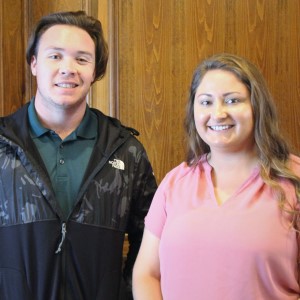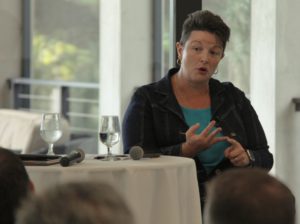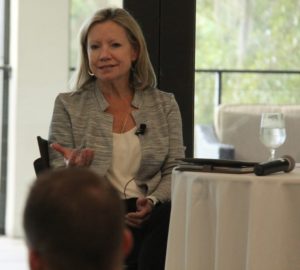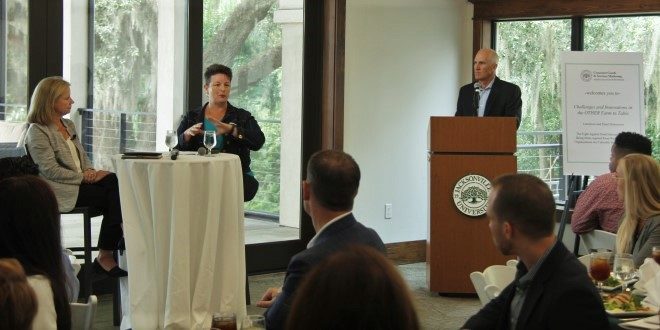Two local food industry experts told a Jacksonville University audience on Friday, Nov. 1, that innovation and public-private partnerships can help solve local food issues.
“Hunger is a problem going on every single day,” Susan King, president and chief executive officer of Feeding Northeast Florida, said during the panel discussion “Challenges and Innovations in the OTHER Farm to Table.” “We can create combinations of for-profits and non-profits to work together to solve these problems.”
Ms. King joined Angela TenBroeck, CEO of Aqua Hortus, a company that grows food in controlled environments using high-end agricultural technology, for the latest event in the Davis College of Business Consumer Goods and Services Marketing Innovation and Disruption in the Consumer Services Industry luncheon series. DCOB Executive-in-Residence Jack Parker facilitated the discussion.

Jacksonville University junior finance/marketing major Max Moore and senior business administration major Megan Osborne organized and managed the event at The River House.
The discussion touched on the topics of hunger, food insecurity and food waste. Ms. King and Ms. TenBroeck illustrated the depth and breadth of the problems both locally and more broadly. They also discussed potential solutions and how their organizations attack the problems from both the charitable and commercial perspectives.
For example, more than 253,000 individuals in Northeast struggle to put food on the table, according to US Department of Agriculture (USDA) statistics. There are 29 food deserts in Jacksonville, Ms. TenBroeck said, where residents have limited or no options to purchase food. To serve those areas, Feeding Northeast Florida operates “mobile grocery stores,” which are refrigerated trucks that bring fresh produce, dairy and proteins to areas of need. Ms. TenBroeck’s company produces “just-in-time” produce for clients, often operating its controlled-environment facilities on “brownfields,” which are land or facilities abandoned because of real or perceived environmental contamination.

“We’re helping to solve the problem by putting food where it’s needed,” Ms. TenBroeck said. “Plus, when you support a local business, you keep money here, you support local innovation.”
Waste is another major problem facing the food industry. The US Environmental Protection Agency (EPA) estimates that in 2015 food waste accounted for 22 percent of landfill volume, and that 30 percent of all food produced ended up as waste. That equals about $218 billion spent on growing, processing and transporting food that is ultimately discarded. The EPA and USDA have set a joint goal of reducing food waste by 50 percent by 2030.
Because so much of the waste is fresh food needing refrigeration, Feeding Northeast Florida addresses the issue as an opportunity. The organization purchased refrigerated transportation and cold storage facilities to take advantage of wholesalers and retailers willing to donate, but not transport or store, potentially wasted food.
Ms. TenBroeck attacked the problem of food waste from the perspective of business opportunity. Her facilities deliver “just-in-time” food grown for specific clients and feature artificial intelligence, which predicts the amount and type of produce the client will need based on factors including past-purchasing patterns and crop type. Since she’s growing food specifically to meet her clients’ needs, waste is virtually eliminated.

Despite the ongoing problems, both Ms. King and Ms. TenBroeck envision eventual solutions, so they ended their remarks on similarly hopeful notes.
“In 10 years, I hope the food bank is out of business,” Ms. King said.
Ms. TenBroeck said: “Working together, we can change the hunger landscape.”
 Wave Magazine Online Jacksonville University News Hub
Wave Magazine Online Jacksonville University News Hub
